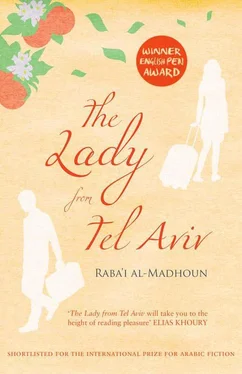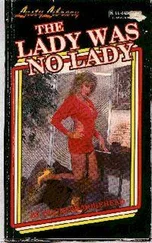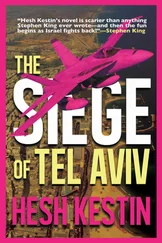As soon as we settle onto the main road, my eyes behold the strangest sight. I can finally recognize Beit Lahia and Jabalia now. Long ago, these twin townships were shapeless, colourless piles of stone and wood and metal — the flotsam of a hurricane that opened up one night long ago and showered the land with shacks and tents. Like falling stars, these structures came crashing into the soil. Hurled down and thrown together — that was how these homes were formed, without recognizable shape or hue, without clear lines, lanes or streets, without any describable features at all. Yet there, amidst this massive pile of homes, grew a beautiful line of houses with a classical Arab style — arched windows like the old mansions of Damascus, like small mouths smiling down from the centre of the town’s destruction. I could not understand how these homes had been spared the carnage. It looked like this housing development was somehow parachuted into Gaza from heaven itself.
‘What is that?’ I have to ask.
They tell me that this beauty smiling at us from the rubble is Sheikh Zayed City, built with aid from the United Arab Emirates. Apartments in the development were given to people who had been injured by the Israelis, or to the families of victims, and to those who had lost their homes during any of Israel’s many incursions into the area. As our car drives by, I stare at these remarkable structures. I go on staring until my eyes fall upon an image of the nice sheikh himself.
We continue along, veering left then right. We come upon a vast stretch of rubble. Abdelfettah says that the houses that used to be there were bulldozed during the Israeli assault of September 2004.
We arrive at a side alley. Abdelfettah stops the car next to a huge poster affixed to the corner of the building directly in front of us. ‘Abu Fadi, this is a memorial for your cousin Falah, God rest his soul.’
My eyes well up at the image of a young man who even in death, maintains a brave, warm smile. He looks like his father Nasreddine when he was that age — the same swarthy skin, the same dark hawk eyes, the same black hair. Falah was the exact image of his father, except for the fact that the occupation had torn it/him in half.
Abdelfettah drives, turns right and slips into another side alley. He pulls over and parks the car in front of a four-storey apartment house with a large iron door. I recognize it immediately: the Nasrite Building.
‘Your mother’s waiting for you upstairs,’ Abdelfettah tells me. ‘Be tough, Abu Fadi. It’ll be fine.’
When I get to the last bachelor pad on the fourth floor, I find the door wide open, inviting me to set foot inside. Abdelfettah tells me to go in by myself while he and his brothers wait behind. ‘Your mother insisted on being alone with you when you arrived. What she said was, “I want to get my fill of him before I have to share.”’
Slightly afraid and hesitant, I step inside. I look around for the mother that the occupation took from me thirty-eight years earlier. I take a few steps into a foyer that seems to open onto a sitting room on the right. Then my eyes catch sight of the fringe of a thatch mat on the floor and the edges of rugs strewn about the hallway. I realize immediately where the sitting room is, and that my mother is somewhere inside.
Abdelfettah whispers something from where he is standing, reminding me to take off my shoes. I take a couple of last steps inside, turn to the right and my mother shrieks: ‘Walid, my son! Welcome home, my beautiful son! I’m so glad you made it! I’m so glad to see you, my lovely, lovely son!’
My mother is sitting hunched over herself on a cotton mattress on the ground. She tries as best she can to get up, even if only to her knees — but I do not give her much of a chance. I bend down and bury my face in her shoulder, hugging her like the child I used to be. I kiss her and she begins to kiss me in return — once for every year I’ve been away. Then we sit and weep. We go on crying, saying nothing. The others outside let us bawl and bawl until our sniffles and snorts come to an end. Silently, they file into the room with looks of astonishment on their faces.
I sit right next to my mother. My hand clasps hers, just like it used to do when I was a child and she would drag me behind her on errands or visits to people’s homes. And I would go running along after her, sometimes clutching her hand, sometimes gripping her dress.
‘Abu Fadi’s here, Aunt!’ Nasser cries.
‘The brightness of your presence has lit up all Gaza, my son! This is the happiest day in my life — I’ve lived to see my boy after all these years! Welcome home, Walid! I’ll say it a hundred times — welcome, welcome, welcome!’ My mother begins to wipe her tears with the end of her headscarf, but the tears refuse to stop pouring. And I, the whole time, watch her face, looking for traces of the mother I knew.
After a while my cousin Nasreddine shuffles into the room, hauling all the years of his life on a cane. All his life, this man has made fun of the dark brown complexion of his skin. And now this man, whose arms were once made of steel, whose body was once that of a titan, is little more than an old man leaning over a walking stick.
Nasreddine — Abul-Abd — greets me warmly as he takes his shoes off at the end of the hallway. He begins to apologize for the way the years have treated him. ‘I’m all messed up, cousin. As you can see, everything is either worn out or broken down.’
‘As long as your odometer is still working, Abul-Abd, that’s all that matters, right?’
Everyone laughs as he replies: ‘That’s the problem, cousin — the odometer is as busted as the motor!’ I pull my hand from my mother’s, and jump up to embrace Nasred-dine. As we hug, we begin to cry. We continue to weep and embrace one another. As a youth, this man never wept — but now he does. He lightens our mood by recalling something we did as children, ‘Remember Grandpa’s goat, Walid? Remember when we took him out to graze in Beit Lahia forest and he ran away from us?’
He laughs and so do I, amidst all our tears. And suddenly I can see him again, the young man who used to carry his grandfather’s goat across his shoulders like it was a kitten.
The sitting room begins to fill with well-wishers, with relatives I am meeting again after so many years, relatives who have grown up and whose faces I can no longer recognize. And relatives born long after I left — children of the occupation.
‘Why were you so late, Abu Fadi? We kept getting ready to come over, but they’d call to tell us you still hadn’t got here.’
‘I got there at 9, but the crossing was closed. They said they caught a girl who was about to blow herself up.’
‘Yeah. We saw it on TV,’ my cousin Khaled interjects, then adds: ‘As soon as the girl walked into the place where they do body cavity searches, they called out to her by name, “Take off your belt, Fida, and walk two steps forward.” Her name’s Fida al-Puss. The television said that she tried to detonate the explosive, but something malfunctioned. Then the soldiers grabbed her and now she’s being detained.’
My cousin Abdel-Halim adds, ‘Did you know, cousin — Fida al-Puss was the very last cat left in the Gaza Strip.’
Everyone around me bursts into laughter at the joke, but I sit there dumbfounded. Abdel-Halim tries to explain: ‘Not so long ago, the PA launched an anti-rat campaign in Gaza. They put out packets of rat poison everywhere. The pussycats devoured the stuff and died. The rats didn’t touch it — and now there are probably more rats than people here. And since the PA had its brilliant idea, there are no cats to catch them.’
‘Sometimes curiosity really does kill the cat,’ I reply, and everyone laughs.
Читать дальше












